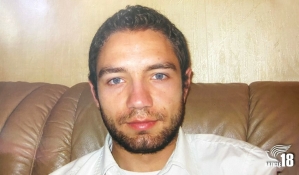
A court in Iran upheld a 10-year prison sentence of an Armenian Christian for “deviant proselytizing” even though evidence against him was so weak that the judge decided the case on only his “intuition,” an advocacy group reported.
The court announced the denial of the appeal of Hakop Gochumyan the first week of June. Detained since summer, he had been convicted in February of “engaging in deviant proselytizing activity that contradicts the sacred law of Islam” through alleged membership and leadership of “a network of evangelical Christianity,” according to advocacy group Article 18.
The conviction of Gochumyan, 35, was based solely on his possession of seven Persian-language New Testaments and visiting two Armenian churches and a Persian-language house-church while on holiday in Iran, the group reported.
“Article 160 of Iran’s Islamic Penal Code allows for judges to use their ‘personal intuition’ when evidence is lacking, and Hakop’s lawyer argued that the judge in this case had been forced to use this provision, having found no other evidence against his client,” Article 18 stated.
Gochumyan’s sentencing in February was not publicly reported at the time, and he was informed that his appeal had failed only this month.
A notorious judge of Branch 26 of the Revolutionary Court of Tehran, Iman Afshari, delivered Gochumyan’s sentence in a case that involved nine others. Including Gochumyan, four of the nine received 10-year sentences; one received a two-year sentence; five were banned from leaving Iran and from living in Tehran and its neighboring provinces for two years, and all 10 were fined a total of 500 million tomans (about US$8,000) and deprived of rights such as membership of political or social groups, the group said.
Authorities confiscated many of their personal belongings, including cash, digital devices and even some properties, according to Article 18.
Iran frequently holds up its Armenian and Assyrian Christian minorities as examples of religious freedom.
“However, the sentencing of Hakop – as well as Iranian-Armenian pastor Anooshavan Avedian, who is also serving a 10-year prison sentence for leadership of a house-church – shows that any ‘freedom’ comes with limitations: specifically the freedom to share one’s non-Muslim faith with others,” Article 18 stated.
Iran has ratified Article 18 of the International Covenant on Civil and Political Rights, which upholds the right to choose one’s own faith, change faith and to share it with others.
“As a signatory to the covenant, Iran is obligated to provide these freedoms but consistently fails to do so,” Article 18 reported.
The late president Ebrahim Raisi was head of the judiciary in 2021 when, in an official response to U.N. experts who had highlighted the arrests of house-church members on “national security” charges, Iran referred to those arrested as “enemy groups of a ‘Zionist cult.’”
Such labeling is an attempt to distinguish Christian converts from Islam, who are not recognized by the state, from the recognized Christians of Armenian and Assyrian descent, who are provided with a degree of freedom to worship provided they do not proselytize, Article 18 stated.
“But there is no freedom whatsoever for any non-Armenian or Assyrian Iranian who wishes to practice Christianity, as they are prohibited from attending the services of Armenians and Assyrians, who are themselves prohibited from preaching in the national language of Persian – all to reduce the chance of conversions,” the group reported.
As a result, converts have no place to worship, so they meet in homes. But these house churches, though no different to any other groups of Christians meeting together to pray and worship around the world, are outlawed, and members are routinely arrested and imprisoned on ‘national security’ charges,” Article 18 reported.
Christian converts from Islam far outnumber the ever-shrinking populations of Armenian and Assyrian Christians, the group said.
Iran ranks No. 9 on Open Doors’ 2024 World Watch List of the most difficult places to be a Christian.





